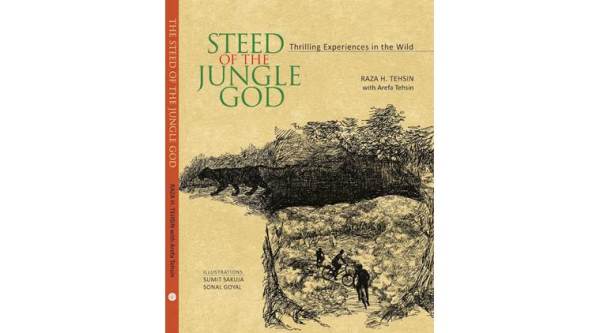In the Woods
The secrets of the wild and why we may never be able to fathom all its mysteries

Tehsin, a pioneering wildlife conservationist, was born to tell these stories.
Title: Steed of the Jungle God: Thrilling Experiences in the Wild
Author: Raza H Tehsin (with Arefa Tehsin)
Publisher: National Book Trust India
Pages: 142
Price: Rs 575
Author: Raza H Tehsin (with Arefa Tehsin)
Publisher: National Book Trust India
Pages: 142
Price: Rs 575
As I was reading Steed of the Jungle God, written by Raza H. Tehsin, I began to think about the expectations with which most of us begin reading a book, and how, those expectations make or mar the experience. With Steed of the Jungle God, I made the mistake of thinking that this was one of those books that are chock-full of the sort of delightful tales from jungles, featuring panthers with personality and mongooses with moxie, that we’ve come to expect from those who write about the wild. In these types of stories, one senses that this is a choice (deliberate or otherwise) made by the writer in order to make the jungle and its denizens seem a little less alien and frightening, even as he or she is careful to spell out that the said denizens are to be treated with the utmost respect and caution.
If you go in expecting tales of this sort from Steed of the Jungle God — as I did — then you’ll be disappointed — as I was, for a while. And that would be unfair to a book that actually contains many a strange and lovely story. Tehsin, a pioneering wildlife conservationist, was born to tell these stories, having been brought up in a family that was entrenched in the hunter’s way of life. He and his siblings were introduced to guns at an early age, developed a love for the great outdoors and were trained in the art and principles of shikar (“It is not sporting to shoot any animal over waterholes, except big cats”).
Tehsin’s goal with this book is not the same as that of many other writers of the wild. His stories are not meant to reassure us that yes, langurs and sloth bears and owls are “just like us only”, but to introduce us to a way of life that is now almost extinct. And, while the tales are mostly nostalgic in tone, Tehsin doesn’t flinch from recounting instances of abject misery that he would frequently encounter in those long ago days. In the prologue, for example, he tells us of how he helped combat guinea worm infections —a major health issue — in a village in southern Rajasthan and notes that the afflicted tribals feared death in the family not because of the loss of a loved one, but because they didn’t have money to cremate the dead. The writer draws our attention to these lives, which are still written about so little, not with the avidity of one trying to make a sensation, but the sensitivity of a person who has spent considerable time living with and witnessing this misery.
But Tehsin’s main aim is to recall to us the fact that the wild holds powers and secrets that we may never be able to fathom. This is where the writing — which sometimes seems bogged down with irrelevant recollections — really shines. Here, the panther in the jungle, eyes glowing the dark, or the gargantuan crocodile taking over a small village pond, acquires the dimensions of a legend, and, offers direct proof of why most animals — and not just the bovine variety — were once worshipped as deities.
Take the title story, for instance, which hints at the secrets contained within Panarwa, a dense jungle turned into a wildlife sanctuary, that lies to the east of Udaipur. One of these secrets is the identity of the “Devta ka Ghoda” or “Devta ro Ghodo” (Steed of the Jungle God) and the story of how the writer encounters this strange creature distinctly lowers the temperature of the reader’s spine. The book abounds in tales like this — singular and mysterious — but the idea isn’t to scare the reader stiff. Even as he recalls the legends of the many chalawa (apparitions), bhoot paleet (ghosts and spirits) and dakkan (witches) that dot the landscape of south Rajasthan, Tehsin is quick to point to the natural phenomena that give birth to such tales. It could, as happens in one story, simply be a pair of Great Horned Owls scaring the wits out of the locals, or, as happens in another story, a bevy of thieving otters putting the fear of god into a group of friends. Still, some questions cannot be answered, and the thought with which one ends the book is that, perhaps, one of the things we lose as India loses her once thick forest cover, is our sense of wonder and mystery.
For all the latest Lifestyle News, download Indian Express App






















No hay comentarios:
Publicar un comentario